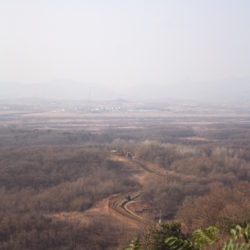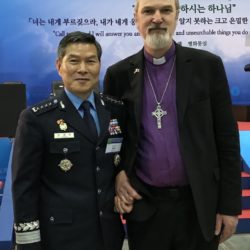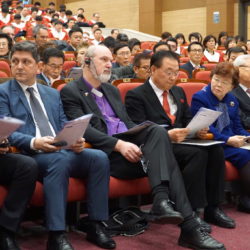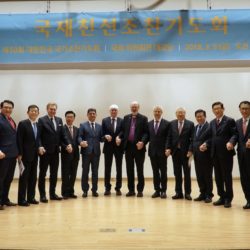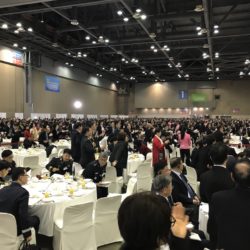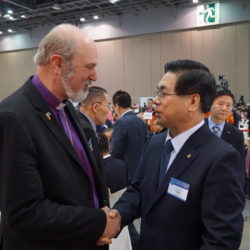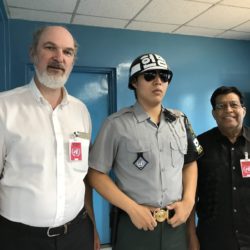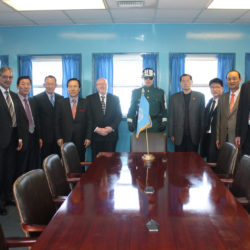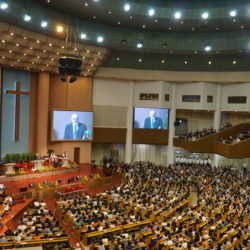Interviews with Thomas Schirrmacher
You spoke with the military in charge in South Korea?

General Michael A. Bills and Bishop Thomas Schirrmacher © BQ/Warnecke
Yes, with Lieutenant General Michael A. Bills, the commanding general of the eighth US army stationed in Korea and of the Korean border troops, and with Jeong Kyeong Doo, the Joint Chief of Staff of the South Korean Army, who presides the three commanders over the forces. In the case of both and other military personnel, it is clearly to be felt that they are hoping and praying that there will be no armed conflict with North Korea, although they’re intensively exercising for it. Incidentally, Bills was stationed in Germany as an officer several times, most recently with high rank for the whole of Europe.
I’ve also, and that not for the first time, spoken with the leading military chaplains. In my view they’re exerting a very positive influence, because they do not religiously super-elevate war, but convey that, ethically, peace is always the better option and war can only be the last option of defence. In addition, due to them there is much prayer in the armed forces for a peaceful solution to the conflict.
What impresses you most?

President Moon Jae-in with his wife (seated, from left) at the National Prayer Breakfast in Korea © BQ/Warnecke
At the National Prayer Breakfast in Korea, where I also briefly met the President and his wife, there was no war rhetoric whatsoever, but over and over again prayer for a peaceful reunification, with Germany time and again being named as an example.
You know the line of demarcation between North and South Korea?
Yes, in fact at several points. Most frequently, of course, I’ve been at the transition of the United Nations between South and North Korea, interestingly in various functions, sometimes as a representative of the World Evangelical Alliance, sometimes as the president of ISHR, at other times accompanied by the most important church leaders of Korea. By now I know the area so well, that I could immediately tell that the shots recently fired at a fleeing North Korean officer were illegal, because the North Korean gunman could achieve the appropriate angle only from South Korean ground.
I have not only got to know the Berlin Wall at various spots, but I also know walls and border fences in Israel, in Cyprus or between India and Pakistan. But Korea is particularly desolate because it actually is a vast no-man’s-land. And while Seoul is getting closer and closer to the border, the North Korean side is for a long distance only no man’s land, where only military can be seen.
Why are you so frequently invited to Korea?

Thomas Schirrmacher with UN vehicle at the border between North Korea and South Korea © BQ/Warnecke
The International Society for Human Rights for long has worked closely with partner organisations in Korea, especially researching the human rights situation in North Korea. There is also my role as Associate Secretary general of the World Evangelical Alliance. Nearly a quarter of Korea’s population belong to Evangelical churches, officially 23.8 percent, with 31 percent Christians overall. This implies a great deal of responsibility. The WEA therefore is trying to exert its influence, in order to continue to support democracy and, for instance, to combat rampant corruption in all areas of society, even in the churches. Fortunately, the Korean churches are opening up more and more to global cooperation and external advice.
You reported on the German reunification in Korea?

The border strip between North Korea and South Korea, viewed from a UN observation tower, overlooking the North Korean propaganda city with flagpole in the background © BQ/Warnecke
Yes, often; I am asked questions about it all the time. The division between North and South Korea is already of much longer duration than the German division, and it goes much deeper. In the beginning there was a cruel war against one another, whose wounds are still not healed to this day. Also propaganda in North Korea has put down much deeper roots. Christians from South Korea told me that at encounters they didn’t recognize their relatives in North Korea, and they were unable to find a common basis for discussion.
In addition, South Korea itself was not a democracy for a long time and still has some democratic deficits, say, in areas such as government corruption. It was only gradually that the theme of ‘freedom’ became the central point of difference.
But yes, German reunification is a constant topic of conversation in South Korea, and the hope has been high since 1989 that Korea could experience something similar. There is a parallel, too. The German reunification occurred when the Soviet Union didn’t support and protect the GDR any longer. However, with regard to North Korea, the Soviet Union was replaced by China which kept North Korea financially alive by payments for access to the sea and holds its protecting hand over the land. When China would terminate its support, reunification should only be a matter of time.
What’s your opinion on the Christmas tree constructions visible for miles on the South Korean side?
Even though the 50 meters high Christmas decorations are adorned by a cross and are set up by Christians in a similar way all over the country: Whether they are lit up or not, is decided by the South Korean Ministry of Defense alone. So they did not shine from 2004 to 2009; since 2010 they shine again. As WEA, we have touched upon the misleading combination of politics and the Christian message several times.
Conversely, it is nonsense for the North Korean government to speak of psychological warfare. Among other reasons, because Christmas is banned in North Korea. For in North Korea no one can see the Christmas trees or the oversized South Korean flags, as the only place in sight, Kijong-dong (German: Kaesong, Friedensdorf), is purely a propaganda city, in which there are, to be sure, a huge statue of the dictator and one of the highest flagpoles with a flag weighing tons, but no residents, except for soldiers. The other way around, South Koreans can very well see North Korean propaganda.
Interview with Radio Vatican
(Original sound of the interview with Vatican News)
Radio Vatican initially wanted to know from Schirrmacher how the current tensions between North Korea and the USA, and therefore also South Korea, would effect Christians in North Korea.

Jeong Kyeong Doo, Joint Chief of Staff of the Korean Army, and Thomas Schirrmacher © BQ/Warnecke
Schirrmacher: It needs to be said that information about the well-being of the Christians in North Korea mostly comes out of the country with time delay, be it by refugees, through contacts or visits to the country. So it’s always difficult to tell what the situation was like on the previous day. Presently it can be observed that the few initiatives, which the churches have in the country, experience that all contacts in the USA are cut. That affects mainly Korean Christians who are active in North Korea, but who are themselves living in the United States. In the very few projects in which South Koreans are involved, nothing has changed right now. As can generally be observed, the rhetoric exclusively refers to America and hardly at all to South Korea. Besides that, the Christians naturally are not faring well, but so far the conflict did not yet have aggravating effects on them.
RV: You have just recently been travelling in North Korea. What is the general humanitarian situation on the local level and what is the specific situation of Christians? One hears of violence against Christians on the one hand and the possibility to have a worship service in peace on the other hand.
Schirrmacher: The diverging reports are due to the fact that there is hardly any country in the world, of which we know so little. What is known, are the descriptions of situations to which someone has direct contact. Either is true: the Christians, who are in penal camps and the Christians, who in some way are perceived as a threat, are in a very bad condition. But there are, of course, tolerated services in the capital, and if you stick to them and are otherwise inconspicuous, then you also have the opportunity to worship together. Not completely free, but with special permission and under observation of the government, so that not a word too much can be said. The sermons must be signed off beforehand; thus these are no free worship services as we would think of it.
RV: A special role is played by South Korean Catholic and President Moon Jae-in – are his offers for dialogue even recognized in the North?

Thomas Schirrmacher preaching in the world’s largest church congregation, the Yoido Full Gospel Church, with an audience of 20,000 in the church ans estimated hundreds of thousands in all Asia © BQ/Warnecke
Schirrmacher: The churches in South Korea have, even with the unbelievers, a very high leap of faith. The general language is, that it were the Christians who took action against the military dictatorship, and who have favoured the introduction of democracy. Compared to others, they are also the ones, who are more in favour of a corruption-free state. That’s why it’s no coincidence that a situation in which the government has been overthrown by corruption, is followed by another Christian president. Surely, the military dictatorship was essentially overthrown by the actions of the churches, but peacefully. This is the basic fundamentals of all Christians in Korea: all are vehemently against a military, violent solution to the conflict. There is intensive prayer for a peaceful solution in almost every worship service I experience. This, of course, is what the Catholic president stands for. I think that this is also very clearly perceived in North Korea and it is one of the reasons why the aggravation of rhetoric is currently not taking place between North and South Korea, but only between North Korea and the United States.
It must be added that the Koreans in general and especially the Korean churches are desperately unhappy that the American side and North Korea are providing themselves rhetorical exchange of blows, without even informing or involving the South Korean side. The capital Seoul with one third of the population of South Korea is situated less than 25 kilometres from the North Korean border, and a few residential areas are extending right up to the borders, so that almost inevitably the capital would be erased (in the case of such an escalation). Thus, if Trump says he wants to wipe out North Korea that is hard to understand for South Koreans. This of course has a lot to do with the mentality of president Trump, who doesn’t involve anyone at all.

Welcoming Young Hoon Lee, pastor of the Yoido Full Gospel Church, at the National Prayer Breakfast in Korea © BQ/Warnecke
The international churches, on the other hand, are perceived quite differently. The Vatican has always had the advantage of his “double face”, as a church and as a state. The advantage of the Vatican is that, in addition to immediate church projects, such as Catholic hospitals in North Korea’s capital, he can even work with the most diplomatic service of the world and utilize many contacts outside the public sphere. The Vatican is playing an important role in what’s happening in North Korea right now, but also in what South Korea expects, because it can make negotiations possible which others cannot make possible, and that under the full seal of secrecy
RV: Christians in North and South Korea pray for peace and an understanding between both parts of Korea, you said – to what extent do the churches contribute specifically to a stabilization within the tense situation?

Prayer for a peaceful reunification of Korea in the Korean parliament with guests from Israel and Romania (to the left of Thomas Schirrmacher) © BQ/Warnecke
Schirrmacher: The consonance of all churches, of all worship services, that one desires a peaceful solution, and the protest against any considerations of warlike measures, is certainly one reason why things are very quiet at the moment between the two countries. Of course, it also makes a difference that church leaders like me can report in North Korea what they have experienced in South Korea. Our confirmation that there are no war intentions, is safe. The churches, to be sure, are quite in favour of South Korea having a combat-ready army, but it’s a comforting factor that such an influential entity, i.e. the Catholic Church and the Yoido Full Gospel Church, the world’s largest Pentecostal congregation, speak in unison regarding this matter.
RV: Does a reunification like in Germany seem possible in Korea?
Schirrmacher: Even as a young pastor I regularly attended church training courses in the GDR and I have witnessed the reunification very closely. The situation in Korea and the situation in Germany at that time are not comparable. In North Korea, the brainwashing succeeded to a shocking extent. You meet very few people who, even behind closed doors, when everything is quite safe, utter any critical queries. No country in all history has managed to isolate the population from external information and to align it to such an extent. The result is that anything like a civil society – even be it only a very small percentage of the population, around which something new could crystallize – does not exist. That makes things extremely difficult.

A delegation of Korean government and church representatives at the UN negotiating table at the line of demarcation between North Korea and South Korea © BQ/Warnecke
Beyond the few open church buildings, the churches lack contact persons. Families from South Korea, who have relatives in the North, report that one cannot talk, because their relatives have never heard of lifestyle matters, like, e.g., that there are countries where everyone drives a car, and that they, politically, have no idea at all, what’s going on outside of North Korea – because they really only know the state news. The effect, which existed in the GDR, that people watched “West German television” and therefore knew what it looked like elsewhere, is completely missing with the North Koreans.
Even if there were a solution to the problems and freedom would come, the people who could help build a new North Korea would be very few in number. That’s where the churches, not only in South Korea, should consider beforehand, how to deal with the problem on day X – when it hopefully comes – and how to create opportunities as soon as possible for the emergence of a civil society. Otherwise there is a risk, that, even if there is no reunification, the enormously strong South Korean civil society would simply take over everything.
- The border strip between North Korea and South Korea, viewed from a UN observation tower, overlooking the North Korean propaganda city with flagpole in the background © BQ/Warnecke
- Thomas Schirrmacher with UN vehicle at the border between North Korea and South Korea © BQ/Warnecke
- Jeong Kyeong Doo, Joint Chief of Staff of the Korean Army, and Thomas Schirrmacher © BQ/Warnecke
- General Michael A. Bills and Bishop Thomas Schirrmacher © BQ/Warnecke
- (from left) General Michael A. Bills, Bishop Thomas Schirrmacher, Johannes Selle, MdB, vice chairman of the German-Korean parliamentary group © BQ/Warnecke
- President Moon Jae-in with his wife (seated, from left) at the National Prayer Breakfast in Korea © BQ/Warnecke
- Prayer for a peaceful reunification of Korea in the Korean parliament with guests from Israel and Romania (to the left of Thomas Schirrmacher) © BQ/Warnecke
- International guests and the Board of the National Prayer Breakfast in Korea © BQ/Warnecke
- With the leadership of the National Prayer Breakfast in Korea © BQ/Warnecke
- National Prayer Breakfast in Korea © BQ/Warnecke
- Welcoming Young Hoon Lee, pastor of the Yoido Full Gospel Church, at the National Prayer Breakfast in Korea © BQ/Warnecke
- Thomas Schirrmacher in front of the UN barracks in the UN protection zone in the center of the demilitarised zone. The barracks stand on both sides of the border, the building in the background is the North Korean border headquarters on North Korean soil © BQ/Warnecke
- On the North Korean side with UN-guard and the president of the Pentecostal World Fellowship, Prince Gunaratnam © BQ/Warnecke
- A delegation of Korean government and church representatives at the UN negotiating table at the line of demarcation between North Korea and South Korea © BQ/Warnecke
- Thomas Schirrmacher speaking in front of international church representatives in Seoul © BQ/Warnecke
- Thomas Schirrmacher preaching in the world’s largest church congregation, the Yoido Full Gospel Church, with an audience of 20,000 in the church ans estimated hundreds of thousands in all Asia © BQ/Warnecke
